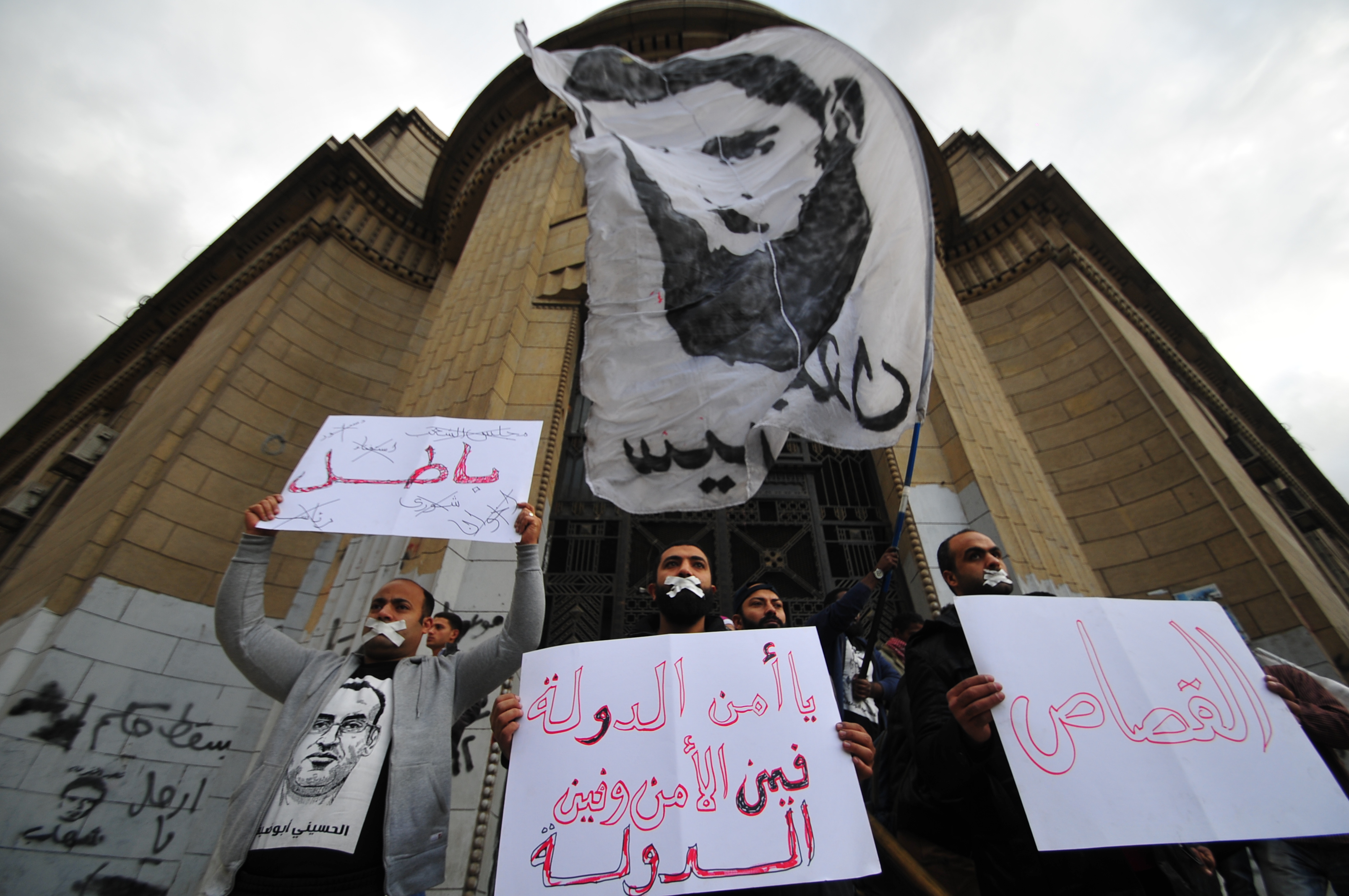
(AFP PHOTO / STR)
The Minya Criminal Court has referred 529 Muslim Brotherhood supporters to Grand Mufti Shawqy Allam, who will provide his opinion on whether or not they should be sentenced to death for attacking a police station, which resulted in the death of one policeman last year.
“This is unprecedented; I have worked as a lawyer for 25 years. I have never seen a case that concludes after three days, said Gamal Abdul Hamid, one of the defence lawyers in the trial.
Abdul Hamid confirmed to Daily News Egypt that the lawyers for the defence were prevented from entering the court to hear the judge’s decision in Monday’s session. He also confirmed that 18 people were acquitted in the trial, adding that 124 defendants were present in court on Monday.
The lawyer stated that the first session of the trial, which involved 547 defendants, was carried out according to procedure on Saturday.
“One of the other lawyers requested for the judge to recuse himself,” Abdul Hamid said, adding that the other defence lawyers stood in solidarity with this request, but noted that the judge’s attitude changed. “He adjourned the session and announced that a decision would be issued on Monday,” said the lawyer.
Neither the defence nor the prosecution presented their arguments, said Abdul Hamid. He decried the decision by the court as “unconstitutional and illegal”.
Hafez Abu Saada, head of the Egyptian Organisation for Human Rights and member of the National Council for Human rights, said he is “astonished” at the verdict. “This is the first time in Egyptian judicial history that more than 500 are referred to the death penalty.” He said the decision is a result of what he believes to have been “very illegal proceedings”.
Abu Saada explained that Allam’s decision is not final, but is instead an opinion that will be given to the Minya Criminal Court to decide on a final verdict. The lawyers and the defendants will then have the opportunity to appeal the verdict with the Court of Cassation. If the appeal is accepted the trial will be heard again in the Minya Criminal Court by a different judge.
The Grand Mufti’s opinion must be received by the court by the next session of the trial, which is scheduled for 28 April.
The Muslim Brotherhood described Monday’s decision as “shocking and unprecedented”, adding that the trial was “without due process” and “is inhumane and a clear violation of all norms of humane and legal justice”. The group said it would “take all legal actions to appeal the court ruling and defend basic rights of Egyptians”.
Human Rights Watch also condemned Monday’s decision. The international watchdog’s Executive Director for MENA Sarah Leah Whitson said the “sentence comes as the result of a judicial process that denied defendants the most basic due process rights”.
She also condemned the court proceedings: “The court prevented defence lawyers from calling witnesses or presenting its case outside of a written submission and failed to assess the individual culpability of each defendant.” Whitson added that the rights group is “deeply concerned that the dozens of mass trials that are taking place on a daily basis in provinces across Egypt are similarly riddled with due process violations and will also result in outrageous sentences that represent serious miscarriages of justice”.
Amnesty international described the decision as a “grotesque example of the shortcomings and the selective nature of Egypt’s justice system”.
Hassiba Hadj Sahraoui, deputy Middle East and North Africa programme director at Amnesty International, said: “This is the largest single batch of simultaneous death sentences we’ve seen in recent years, not just in Egypt but anywhere in the world.” She added: “Egypt’s courts are quick to punish Mohamed Morsi’s supporters but ignore gross human rights violations by the security forces.”
Abu Saada stressed that this is only a primary decision. “I couldn’t say this isn’t independent, we find mistakes,” he said, adding that judicial systems around the world have different stages in order to correct these mistakes. He did say that the mass trials could be used by the authorities to send a message amid “an atmosphere focused on terrorism and the rhetoric of Egypt being at war”.
Minya is expected to host the first session of the trial of 636 people, including Supreme Guide of the Muslim Brotherhood Mohamed Badie. They are accused of inciting and carrying out an attack on Edwa Police Station, also in Minya Governorate. Abdul Hamid, who is also a lawyer for the defence in Tuesday’s trial, said that the lawyers are considering a boycott of the trial, which he believes would make any verdict in the trial invalid. The verdict for Tuesday’s case is expected on Thursday, according to Abdul Hamid.
Violence spread across Egypt following the violent dispersal of pro-Morsi sit-ins on 14 August. The governorate of Minya saw some of the worst violence, much of it sectarian. Amnesty International, the Egyptian Initiative for Personal Rights, and Human Rights Watch all called for increased protection of Coptic Christians around the country.

